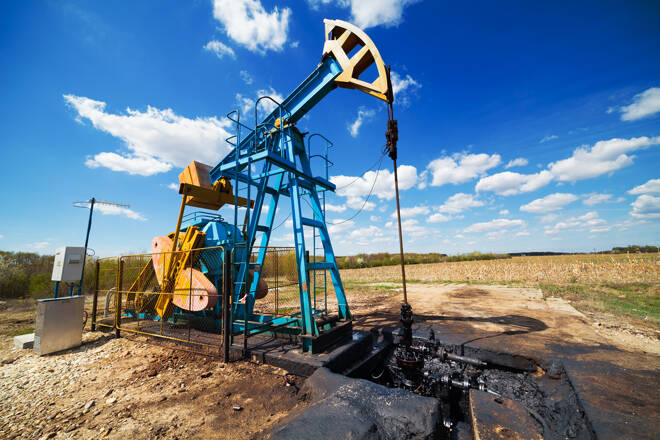Advertisement
Advertisement
How Tensions Between Russia and Ukraine Can Affect the Markets?
By:
Oil and gas markets are likely to advance as a consequence of Russian military action inside the Ukraine.
It’s reported more than 100,000 Russian troops are positioned at Ukraine’s eastern border, despite Moscow denying claims of a pending invasion. Sparking global interest, and a number of nations urging its citizens to leave Ukraine, world leaders continue to pursue a diplomatic resolution.
Germany’s Chancellor Olaf Scholz is bound for Russia later today to hold talks with President Vladimir Putin. This follows his meeting with the Ukrainian president, Volodymyr Zelensky, in Kyiv on Monday.
Scholz informed reporters in Kyiv there was ‘no reasonable justification’ for the Russian military build-up on Ukraine’s borders.
Also of note on Monday, in a call between US President Joe Biden and UK Prime Minister Boris Johnson, both leaders agreed that a window of diplomacy remains open, according to a Downing Street spokesperson following the call.
Additional developments on Monday witnessed US Secretary of State Antony Blinken announce that the US embassy in Kyiv will shut its doors and temporarily relocate to the western city of Lviv. ‘I have ordered these measures for one reason, the safety of our staff, and we strongly urge any remaining US citizens in Ukraine to leave the country immediately’, Blinken added in a statement.
Preparation is Key
Global equities took a hit on Monday amid escalating tensions. The FTSE 100 dropped nearly 1 percent and the DAX shed 0.6 percent. Across the pond, the S&P 500 fell 0.4 percent and the Dow Jones Industrial Average erased 0.5 percent.
According to reports out of Russia’s Interfax news agency today, however, a number of Russian units have left the Ukrainian border and are headed back to their bases. Cheered by markets, European indices are higher across the board as well as US equity index futures trading on solid footing, at the time of writing. Risk-sensitive currencies also trade firm, in addition to US Treasury yields rising across the curve.
As a trader or investor, preparation is key to attaining consistency and preparing for the insanity of war can be particularly challenging.
Although tensions appear to have stabilised for now, many market participants consider safe-haven assets the ‘go-to’ investment vehicles in times of turmoil. The Japanese yen will be a key ‘watch’ should war be declared, anticipated to find demand as investors seek safety.
Consequently, bearish scenarios across USD/JPY, EUR/JPY and GBP/JPY currency pairs are possible. EUR/JPY has been entrenched within a consolidation between ¥132.72 and ¥127.95 since late June 2021. Technically speaking, though, the immediate trend faces north (see EUR/JPY daily chart). An invasion may equally underpin the Swiss franc, the US dollar and gold (XAU/USD), all of which are perceived safe-haven markets.
Oil and gas markets are likely to advance as a consequence of Russian military action inside the Ukraine. With the demand of oil at multi-year highs—oil prices touched seven-year pinnacles in recent days and reached a high of US$95.79 a barrel—there are concerns a war (or sanctions) on Russia could cut supplies and guide oil prices higher, movement stoking inflation worries. Note that Russia is the second largest oil producer in the world.
Speaking to CNBC’s Squawk Box Europe, veteran strategist David Roche was asked whether he saw a significant three-digit handle on the price of oil in the event of war. Roche stated that he believed oil prices could reach as far north as US$120 a barrel.
In terms of global equity markets, temporary declines across the board would be expected. Jeff Schulze, ClearBridge Investments Investment Strategist, joined Yahoo Finance last week and said ‘conflict would cause only a momentary sell-off across equity markets’.
DISCLAIMER: This material on this website is intended for illustrative purposes and general information only. It does not constitute financial advice nor does it take into account your investment objectives, financial situation or particular needs. Commission, interest, platform fees, dividends, variation margin and other fees and charges may apply to financial products or services available from FP Markets. The information in this website has been prepared without taking into account your personal objectives, financial situation or needs.
You should consider the information in light of your objectives, financial situation and needs before making any decision about whether to acquire or dispose of any financial product. Contracts for Difference are derivatives and can be risky; losses can exceed your initial payment and you must be able to meet all margin calls as soon as they are made. When trading Derivatives you do not own or have any rights to the derivatives underlying assets.
About the Author
Aaron Hillcontributor
Aaron graduated from the Open University and pursued a career in teaching, though soon discovered a passion for trading, personal finance and writing.
Advertisement
